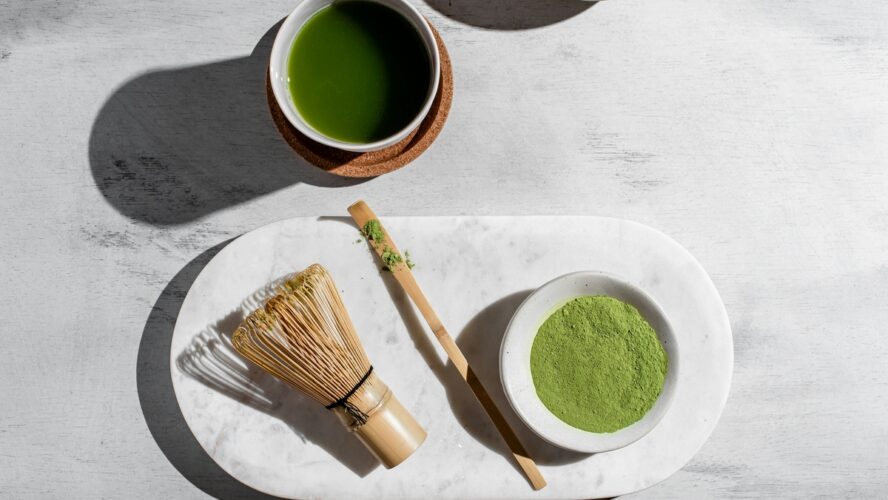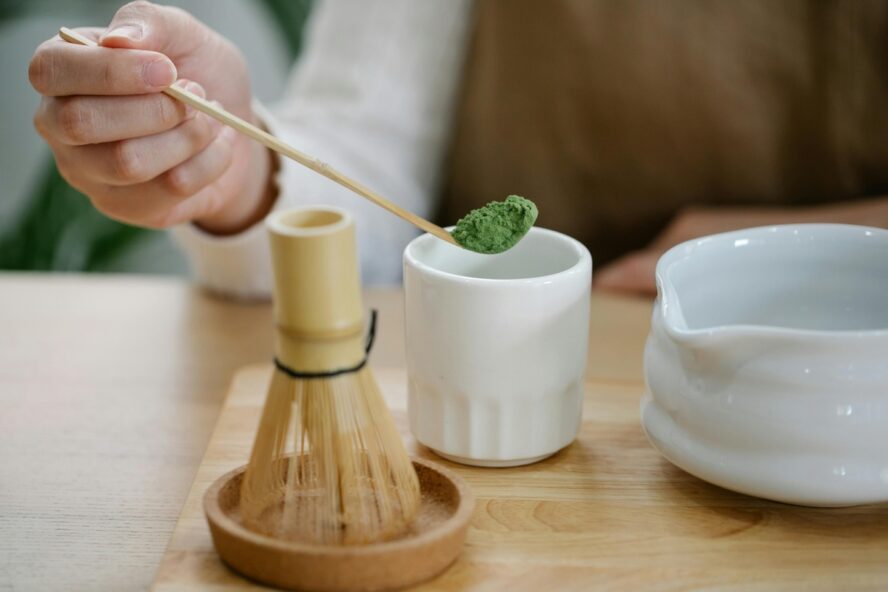
If it feels like you’ve been seeing a lot of matcha-flavored drinks, cakes, and cookies of late, you’re not wrong. The popularity of this Japanese green tea powder seems to know no bounds, with consumption reaching a record high last year1. This year, the market for the drink reached a value of a whopping $4.3 billion, and demand is so high that suppliers are having a hard time producing enough matcha to sate the world’s thirst.
It’s no surprise that matcha is so popular. With an earthy flavor and a vibrant green color, it’s the perfect balancing base for a not-too-sweet latte or dessert. But perhaps even more essential to its success are matcha’s health benefits, which affect everything from skin to gut health, to emotional wellbeing and sleep.
What Is Matcha Made Of?
Matcha is a powder made from finely ground green tea leaves — essentially, green tea concentrate. True matcha is made from tencha, a shade-grown green tea leaf that has a richer concentration of nutrients and amino acids than green tea alone. And since green tea already boasts so many health benefits, it should come as no surprise that matcha is a veritable powerhouse of bioactive compounds.
I’ve been drinking matcha for close to 20 years and find it to be a superior choice over coffee and other superfood drinks.
Dr. Elizabeth Trattner, A.P, DOM
“Unlike steeped green tea, matcha involves consuming the entire leaf in powdered form, (essentially a whole food) leading to higher concentrations of polyphenols, L-theanine, and caffeine,” explains Dr. Elizabeth Trattner A.P, DOM. “I’ve been drinking matcha for close to 20 years and find it to be a superior choice over coffee and other superfood drinks.”
New Research Showcases Matcha’s Benefits for Emotional Perception and Sleep

Last year, Japanese researchers published a study in PLOS One focusing on the effects of matcha supplements on older Japanese adults between 60 and 85 years of age with mild cognitive impairment or decline2. They found that the supplements improved participants’ emotional perception — for example, their identification of facial emotions. The supplements were also found to enhance the quality of the participants’ sleep.
“The present study suggests regular consumption of matcha could improve emotional perception and sleep quality in older adults with mild cognitive decline,” the study authors wrote. “Given the widespread availability and cultural acceptance of matcha green tea, incorporating it into the daily routine may offer a simple yet effective strategy for cognitive enhancement and dementia prevention.”
Other Health Benefits of Matcha
So, is matcha healthy? Well, these new findings join a litany of other previously identified health benefits of matcha. Matcha is rich in catechins, particularly EGCG, a powerful antioxidant. In a 2014 study in the European Journal of Nutrition, these polyphenols were found to reduce blood pressure and improve lipid metabolism, supporting cardiovascular health overall3.
Matcha for Healthy Skin
EGCG is also responsible for matcha’s skin benefits, according to Trattner, who has found that the polyphenol has phenomenal anti-inflammatory and antioxidant effects for her patients. And it’s not just matcha — she cites clinical research published in Antioxidants in 2016 showing that green tea extracts can help reduce sebum production, improve acne, and even support the skin’s resilience against UV exposure and photoaging4.
“This is likely due to its ability to neutralize free radicals before they can damage collagen or accelerate visible aging,” she explains, “both important factors living in Miami where we see more acne and sun damage and going into warmer months of the summer.”
Matcha for Gut Health
If you only drink green tea for the skin benefits, it would still be worth it — but that’s not all it offers. Matcha has also been found to be beneficial for gut health, with a 2023 study in the Journal of Clinical Biochemistry and Nutrition finding that just two weeks of daily matcha consumption significantly changed the microbial composition of gut microflora5.
More specifically, matcha increased the prevalence of Coprococcus, a genus of bacteria that has been associated with improved mood and cognition6. On the flip side, an absence of Coprococcus has been linked to higher incidence of metabolic diseases like diabetes. Trattner highlights this “promising” discovery, noting that it suggests matcha’s health benefits are far more widespread than we may have previously thought.
A Bona Fide Brain Booster

Despite the many amazing effects of matcha, Trattner believes that these health benefits pale in comparison to matcha’s brain-boosting power. “The most exciting findings are those confirming what Buddhist monks intuited centuries ago — matcha creates a unique state of focused calm,” she says.
“Matcha’s traditional use among Zen Buddhist monks as a pre-meditation tonic underscores its deep roots in ritual and mindfulness,” Trattner continues. These powers have been clinically proven in studies like a 2008 randomized controlled trial published in the Asia Pacific Journal of Clinical Nutrition7. “This unique neurochemical profile is why matcha remains foundational in my personal and clinical rituals today,” she says.
These benefits come down to the natural presence of two essential substances in matcha: caffeine and L-theanine. The latter is an amino acid that has been found to relax the mind without causing drowsiness8. It has even been found to reduce stress and anxiety, according to a 2016 research review in the Journal of Nutrition and Intermediary Metabolism9.
The most exciting findings are those confirming what Buddhist monks intuited centuries ago — matcha creates a unique state of focused calm.
Dr. Elizabeth Trattner A.P, DOM
Matcha vs. Coffee
When you compare the caffeine in matcha vs. coffee, coffee wins out — but more caffeine isn’t always better. The synergy between caffeine and L-theanine in matcha, explains Trattner, “promotes a state of calm alertness, improving reaction time and focus without jitteriness.” She cites a 2010 study in Nutritional Neuroscience showcasing the power of this double-whammy of caffeine and L-theanine10.

Seeing as a single gram of matcha contains a whopping 44.64 mg of L-theanine (as compared to about 6.56 mg per gram of regular green tea)11, it’s an incredible support in promoting what Trattner characterizes as “a meditative yet alert state.” Most people wouldn’t exactly call the effects of coffee “meditative,” so it’s safe to say the L-theanine makes a difference.
Not All Matcha Offers the Same Health Benefits
Unfortunately, not all matcha is created equal. According to Trattner, it’s essential to source matcha carefully, seeing as many cheaper brands are contaminated with heavy metals like lead, aluminum, and chromium. “This contamination can come from soil and air pollution in non-pristine growing environments,” she says.
Indeed, a 2020 study in Evidence-Based Complementary and Alternative Medicine found that several commercial green tea products exceeded allowable limits for lead and chromium12. It’s something we always have to be conscious of in our pursuit for health. A 2023 study in Nutrition and Health found that “superfoods” like quinoa, chia, and goji berries were often heavily contaminated with toxic heavy metals13, and the same goes for supplements like protein powder.
How to Source Clean Matcha
For the best quality and maximum health benefits, Trattner recommends sourcing matcha from Japan, particularly from the regions of Uji or Kyoto. These matcha powders have stricter agricultural standards, she says, meaning that there’s a lower risk of contamination. “Avoid matcha from China, India, and areas like Fukushima in Japan),” she suggests.
She recommends seeking out shade-grown matcha, aka tencha, which contains more chlorophyll and amino acids. She also suggests looking for ceremonial-grade matcha, which is made from the first harvest, improving both its flavor and health benefits. Organic products that have been third-party tested are ideal, she says, noting that labels should also include a harvest date and tracing information.
Her brands of choice include Matcha Kari, founded by Dr. Andrew Weil which is offered in ceremonial grade, culinary grade, and a ceremonial barista blend which is sort of in between the first two options. “[Dr. Andrew Weil] has been a huge proponent of matcha since the 1970’s and has been able to source some of the best matcha for consumer use, having spent over 50 years going back and forth understanding the matcha market in Japan before it became a fad here in the States and around the world,” she explains.
She also loves the matcha options from matcha.com. This company, she says, “prides itself for its transparency and commitment to authentic, ceremonial-grade matcha sourced from pristine Japanese farms. Their matcha aligns with both modern standards and traditional wisdom.”
Sources:
- https://www.foodnavigator.com/Article/2025/04/09/matcha-trend-boosting-sales-but-threatening-supply/
- https://journals.plos.org/plosone/article?id=10.1371/journal.pone.0309287
- https://pubmed.ncbi.nlm.nih.gov/24861099/
- https://pubmed.ncbi.nlm.nih.gov/28036057/
- https://pubmed.ncbi.nlm.nih.gov/36936880/
- https://www.cambridge.org/core/blog/2023/12/13/coprococcus-in-your-gut-the-secret-of-happiness/
- https://pubmed.ncbi.nlm.nih.gov/18296328/
- https://apjcn.nhri.org.tw/server/APJCN/17%20Suppl%201/167.pdf
- https://www.sciencedirect.com/science/article/pii/S2352385915003138?via%3Dihub
- https://pubmed.ncbi.nlm.nih.gov/21040626/
- https://pmc.ncbi.nlm.nih.gov/articles/PMC7796401/
- https://pubmed.ncbi.nlm.nih.gov/33299455/
- https://pubmed.ncbi.nlm.nih.gov/37812435/

